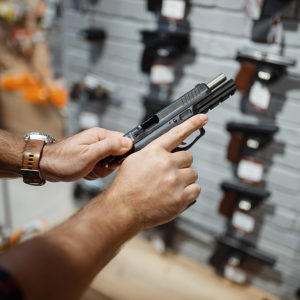With legislation looming to shut it down, Department of Safety Commissioner Robert Quinn implemented yet another policy overhaul of New Hampshire’s “gun line” on Monday, hoping to appease critics who call the state’s background check system both redundant and a danger to Second Amendment rights. Most states don’t have a point-of-contact for background checks and instead leave them to the federal government.
In his new policy memo, Quinn acknowledged “current procedures undermine the stated purpose of the NICS (National Instant Criminal Background Check System),” which he said is “to provide an immediate determination of whether a commercial transaction would violate federal law.” The commissioner wrote that an immediate determination is not only fair to the firearm dealer but to the purchaser’s constitutional rights.
Without the “gun line,” which currently processes all handgun sales, the Federal Bureau of Investigation would handle all background checks for Granite State firearm purchases. There are 29 states that operate entirely through the FBI for the checks.
As the department attempts to bring the “gun line” up to acceptable standards, gun rights activists disagree on the proper remedy.
Executive Councilor Dave Wheeler (R-Milford) told NHJournal he’s been working with Quinn on improving the policy and ensuring citizens’ rights are protected. “There’s no reason we shouldn’t keep this in state,” Wheeler said. “The new policy changes are a great step in the right direction, but we’re not 100 percent there yet,” noting there are more changes he will continue to iron out with the department.
“Whatever the case, a right delayed is a right denied. The ‘gun line’ has been working to clean up their backlog, but we must never allow this to happen again,” Wheeler added. “Even when firearm sales spike because of riots, pandemics, or any other reason.”
According to Wheeler, keeping the “gun line” in-state allows officials like himself to work on problems close to home. “We have an all-Democrat federal delegation,” says Wheeler. “They’ve been against gun rights for a long time. There’s no way I can get them to go to bat for New Hampshire gun owners down in D.C.,” he says. “With it in state, I can call [Commissioner Quinn] anytime, or pop into his office. Officials here are accessible, unlike the Washington bureaucracy.”
Others say it creates an unnecessary burden for gun buyers and the state should leave the instant checks to the FBI.
“Despite all of these problems, some pseudo gun activists are claiming the New Hampshire ‘gun line’ can be ‘fixed’,” wrote Alan Rice, state director for Gun Owners of America. “Disbanding it is the only solution — and we are hearing that legislation to do that is forthcoming, as well.”
As attorney Sean List told NHJournal, a bill has been submitted by Senator Bob Giuda (R-Warren) that will repeal the state’s authority to act as a partial point-of-contact for NICS checks. List said he drafted the language for Giuda following multiple complaints from his firearm dealer clients. Delays at the gun line “have come at a great cost to the economic wellbeing of dealers and the constitutional rights of firearm owners and purchasers,” List said, referencing the reality that dealers have to hold on to inventory, sometimes for months, waiting for the all-clear.
Under federal law, dealers have the ability to transfer the firearm after the third business day if they have not yet received a response. List said most dealers can’t risk doing that, because the “gun line” has come back with a denied status after the transfer in the past. Most, according to List, will hold on to the firearm and wait to transfer until the state’s permitting unit gives an approved status. The delays at the “gun line” have forced some dealers to hold on to much inventory, creating storeroom problems, as well as cash flow.
Rice tells the story of a New Hampshire dealer that transferred the firearm to the customer, who then received a denial from the “gun line” two days later. Rice wrote that the New Hampshire State Police then enlisted the dealer to help them retrieve the firearm. Now, according to Rice, the dealer has a used firearm on his hands and a loss of revenue.
Under the new policy, the “gun line” will only investigate a delayed status for a maximum of 88 days, which is in line with federal standards. After that period, requests still pending will expire and be purged from the system. The new procedures also state the goal of the Permits and Licensing Unit shall be to perform an “instantaneous” check in no less than 90 percent of commercial handgun purchases.
Commissioner Quinn wrote he considered transferring the responsibility for conduction background checks to the FBI, as some demanded, but decided against it. “State law prohibits firearm sales to individuals under an ex parte domestic violence protective order,” Quinn wrote. “Federal law only restricts firearm sales in such instances after the person received actual notice and an opportunity to participate in a hearing.” To follow state law, Quinn said, the state must continue to act as the partial point of contact, saying it “benefits public safety.”




